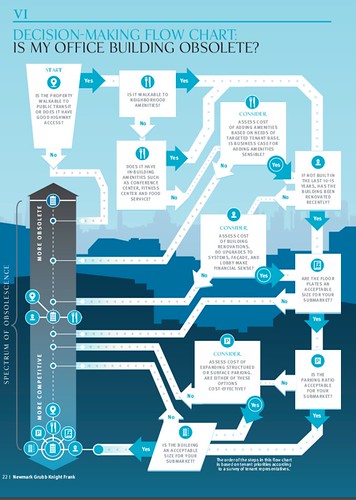They estimate that 14% to 22% of total suburban office space is obsolescent, but some markets, like Suburban Boston and San Francisco remain strong, and certain suburban locations, with transit connections (like Reston, Virginia) or great highway connections are strong also (see "Silver line reshaping commercial office market in Fairfax County").
(This reminds me of a conversation I butted into at a CNU conference a couple years ago. A workout manager for a commercial property in Gaithersburg--which will go unnamed--suggested putting itinerant markets in the mall's parking lots. I said he'd be better off 'tearing the property down and doing something else with it.')
Some of the options, not particularly attractive sounding to me, include conversion to storage centers.
Note that as this relates to the Washington, DC area, this report builds on an earlier one, The Success of Best-in-Class Properties in Washington's Bifurcated Office Market, which makes the argument that office consolidation, especially related to federal agencies in the suburbs, has "produced" a large amount of less than Class A properties which are not appealing despite lower prices, as top properties, with transit access and a wide array of amenities, are grabbing market share, in the center city and the suburbs.
Decision-making flow chart from the report

Yes -- although the "best in class" includes transit or metro access, that isn't the most important factor. Arlington's CRE problem can be basically explained this way -- good transit, but very out of favor and too old.
ReplyDeleteNot the difference in residential -- class B, C properties there are doing quite well across the board.
Very good clarification. The report is big on the Class A/amenities elements.
ReplyDeleteTransit is a locational advantage, but you're right that it won't make a difference for sub-A properties.
Really, it might even be A+ properties as opposed to what used to be considered A.
The report discusses how BRAC has impacted Arlington, how FDA consolidation has impacted MoCo, and how recapture of NIH off campus space back onto the campus will further reduce demand in MoCo.
As you know, outside of Tysons and really, Reston, FFX has issues, etc.
I heard that office space obsolescence is a problem even in DC. The Golden Triangle BID is dealing with old buildings and layouts (e.g., law libraries).
ReplyDeleteNot sure why you can't replace those directly with a cube farm, ahem "hotel offices", though. Perhaps you could explain?
cube farms are out too. People want unobstructed spaces, less focus on individual offices, etc.. See the article in the Post last week about the design of Facebook's offices, which are in a new building.
ReplyDeleteSimilarly, there was an article like that in the NYT about space in NYC.
Thanks.
ReplyDeleteThank you for providing such valuable information.
ReplyDeleteThis post is about a suburban office.
Visit here to buy online medicines-"Online Medical Store"